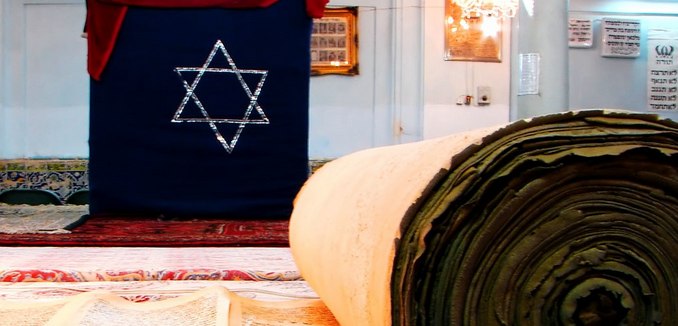Two synagogues have been vandalized in the southern Iranian city of Shiraz, with attackers ripping Torah scrolls, prayer books and ritual objects, the Jewish Telegraphic Agency reported on Thursday.
The Kashi Synagogue was attacked Sunday night, while the Hadash synagogue came under assault on Monday afternoon. Blurred video footage aired on television showed damage done to the prayer houses.
A member of the local Jewish community told Channel 10 that the attack was related to U.S. President Donald Trump’s decision to recognize Jerusalem as Israel’s capital.
“Obviously they are scared,” Sam Kermanian, senior adviser to the Iranian-American Jewish Federation, who has been in touch with Jews from Shiraz, told JTA. “They’re not comfortable speaking freely, but overall, life goes on.”
The perpetrators ripped Torah scrolls, damaged dozens of prayer books, some of which were thrown in the toilet, and “soiled” prayer shawls and tefillin, the leather phylacteries traditionally worn by men during prayers. The attackers also broke glass and stole silver ornaments that adorned the synagogues’ Torah scrolls.
“In light of these clearly anti-Semitic incidents we call upon the authorities in the Islamic Republic of Iran to ensure the protection of all places of worship as well as all members of our community, and to bring the perpetrators of these criminal acts to justice,” read a statement by leaders of the Iranian-American Jewish Federation.
About 10,000 Jews live in Iran at present and Kermanian warned that anti-Semitic propaganda has been on the rise in Iran in recent months.
The Jewish community in Shiraz, which today numbers about 2,000, has come under attack before. 10 members of the community were sentenced to prison terms for spying for Israel in 2000, a move which was condemned by the U.S. government and Jewish organizations.
A group of Jewish diamond dealers from Shiraz told The Tower in March, on the condition of strict anonymity due to concerns for their safety, that “We have to stay within our community and cannot go to Israel. If we speak publicly, we could be accused of being spies if the government thinks we are doing anything political for Israel.” They practice their faith quietly to avoid attracting undesired attention from authorities.
Though Iran’s Jewish population has dwindled, possibly to just 10% of the size it was before the 1979 Islamic Revolution, the regime likes to highlight its existence in order to project “its capacity for tolerance,” Roya Hakakian, a prominent Iranian-American Jewish author and journalist observed in August 2015.
Yet despite the small size of Iran’s Jewish community, the nation’s leaders “continued to employ anti-Semitic rhetoric in official statements and sanction them in media outlets, publications, and books,” according to the 2016 State Department report on religious freedom around the world. The findings of the State Department are consistent with those of the Institute for the Study of Global Antisemitism of which noted in its January 2016 report on Iran, “Antisemitic propaganda distributed by official or semi-official media as well as high-ranking clerics can create a dangerous atmosphere for the Jews.”
[Photo: Hamed Saber / WikiCommons]




